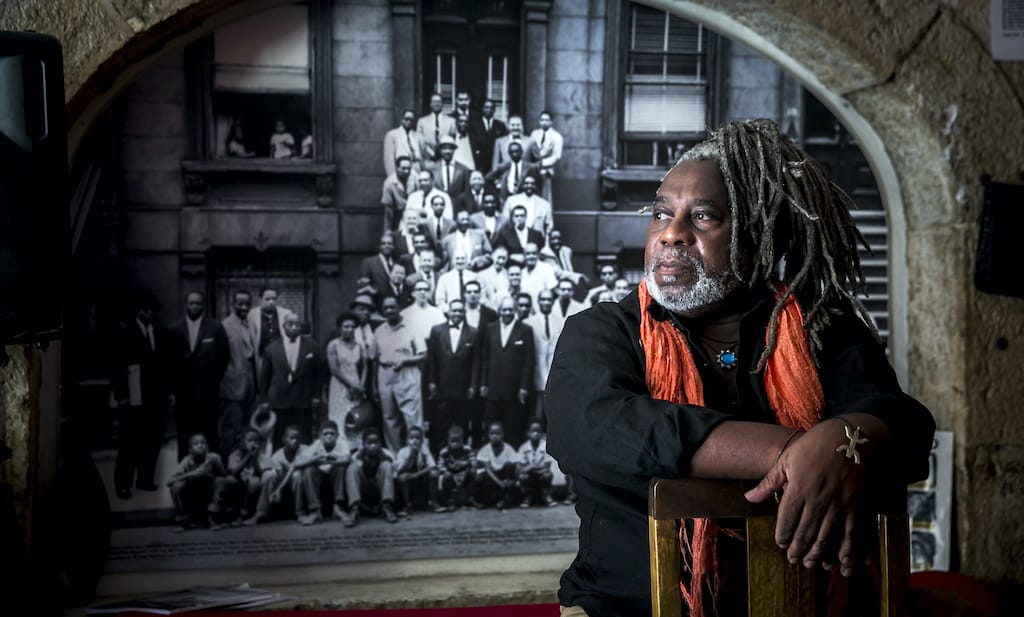Up on the walls of O Frade’s polished interior is an old radio that catches the eyes of most clients. The music wafting from it is part of an illusion: “We hid the wireless speakers we use inside it because the radio doesn’t work anymore,”’ says chef Carlos Afonso, who runs this small new restaurant alongside his cousin, Sérgio Frade.
The radio came from their grandmother’s house and is there to remind them of the very long afternoons the two cousins spent around the dining room table, eating with their families. “That’s where we first learned to appreciate food,” Carlos recalls.
Food has always been a serious subject for both. O Frade’s namesake is an old taberna that was run by Sérgio’s family members in their hometown of Beja during the ’60s. Back then, tabernas were a big part of the way of life in the Alentejo region, serving as meeting points where men gathered after work, to eat (a little), drink (a lot) and (when the mood was right) to sing the famous Cante Alentejano, polyphonic form of singing that UNESCO designated as an Intangible Cultural Heritage in 2014.

Sérgio’s grandmother was such a great cook that O Frade quickly grew from a taberna into an actual restaurant, though it doesn’t exist anymore. His father, her son, got into winemaking a few years ago, using the old Roman technique of preserving the wine in clay amphorae, something that is also very common in the area of Alentejo. There they call it vinho de talha (amphora wine), exactly the type of wine taberna owners would serve customers, usually from their own batch.
The restaurant as it is today was born as a sort of dare between the cousins. Sérgio was looking for a place in Lisbon to open a small wine bar where he could show the capital’s audience his father’s wines. Carlos initially helped him design a small menu, so there would be some simple bites to go with the wine. But one day, one cousin challenged the other: “What if we did something with real food?” By then, Carlos was tired of the fine dining scene – “Love the method, don’t like the food that much,” he confesses – and jumped at the opportunity.
Carlos started his career in food late at the age of 25, after studying hospitality for a few years. But from the moment he set foot in the kitchen, he’s been eager to learn. That eagerness led him to work alongside Michelin-starred chefs Alexandre Silva and Hans Neuner, among others, in addition to some experiences outside Portugal. He mostly worked in upscale restaurants, even though he’s always been more fond of the typical hearty food he grew up with. “In every place I worked I always made myself available to prepare staff meals. That was my way to keep cooking the food I loved,” he says. It’s why the challenge of O Frade was so appealing.

Even though the restaurant is a tribute to their family roots, no one would mistake it for an old venue. The center of the U-shaped counter opens into the tiny kitchen, making for interesting contact between clients and cooks. The food is simple and hearty, expected given its background. The menu presents an assortment of Alentejo recipes in small portions, to share, like the coelho de coentrada (cold rabbit with coriander sauce), roasted peppers, scrambled eggs with túberas (a type of truffle found in the Alentejo) or papada (pork jowl) served with toasted bread and garlic. But there are also some main dishes to choose from, which change regularly. One of Carlos’ favorites is the xerém de berbigão (corn flour mash with cockle), a typical dish from the Algarve, the southernmost region of Portugal, where he worked for a couple of years.
Desserts are also a must, namely the encharcada, an egg-based sweet of conventional origin, and the chocolate mousse, to which they give a little twist: olive oil and fleur de sel. To complement each dish, Sérgio will happily pour several of his father’s wines: after all, if it wasn’t for them, none of this would exist.
Even though they opened just a couple of months ago, the family has already come from the Alentejo and gathered in the restaurant for more than one occasion. “When they came here, they jumped right into the kitchen, and my mother actually brought food along from home,” Carlos tells us smiling. Old habits really die hard.
 June 20, 2019 Flor da Selva
June 20, 2019 Flor da Selva
Walk through Lisbon’s Madragoa, a neighborhood of cobblestoned streets and small houses, […] Posted in Lisbon May 4, 2019 Botequim
May 4, 2019 Botequim
Next to some wooden shelves overloaded with spirits, a photograph of Natália Correia […] Posted in Lisbon August 19, 2022 Tabernáculo by Hernâni Miguel: Local Legend
August 19, 2022 Tabernáculo by Hernâni Miguel: Local Legend
Despite its name, Tabernáculo by Hernâni Miguel is not a church. It is a sanctuary and […] Posted in Lisbon
Published on June 26, 2019
Related stories
June 20, 2019
LisbonWalk through Lisbon’s Madragoa, a neighborhood of cobblestoned streets and small houses, and you'll be hit with the intoxicating smell of freshly roasted coffee. Follow the scent and you are likely to find yourself in an utterly unique spot: Flor da Selva, one of the last wood-fired coffee roasters in Europe. Manuel Alves Monteiro, from…
May 4, 2019
LisbonNext to some wooden shelves overloaded with spirits, a photograph of Natália Correia hangs on the wall. The photo’s placement makes it appear as if Correia, cigarette in hand, is surveying the small room, which is crowded with semi-broken tables. The late poet and upstart co-founded this tiny bar/café a few decades ago, and her…
August 19, 2022
Lisbon | By Margo Gabriel
LisbonDespite its name, Tabernáculo by Hernâni Miguel is not a church. It is a sanctuary and haven of sorts, though, a place where the local community gathers weekly for African and Portuguese food, wine and live music. Ministering to this congregation is Hernâni Miguel himself, one of the vibrant Bica neighborhood’s best-known characters. “Estás boa?”…



















































































